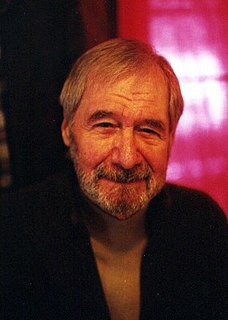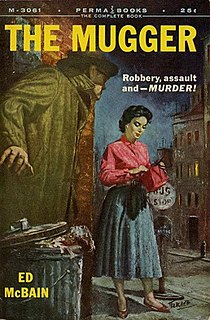Deaf-mute is a term which was used historically to identify a person who was either deaf using a sign language or both deaf and could not speak. The term continues to be used to refer to deaf people who cannot speak an oral language or have some degree of speaking ability, but choose not to speak because of the negative or unwanted attention atypical voices sometimes attract. Such people communicate using sign language. Some consider it to be a derogatory term if used outside its historical context; the preferred term today is simply "deaf".

Ed McBain was an American author and screenwriter. Born Salvatore Albert Lombino, he legally adopted the name Evan Hunter in 1952. While successful and well known as Evan Hunter, he was even better known as Ed McBain, a name he used for most of his crime fiction, beginning in 1956. He also used the pen names John Abbott, Curt Cannon, Hunt Collins, Ezra Hannon, and Richard Marsten, amongst others. His 87th Precinct novels have become staples of the police procedural genre.
The 87th Precinct is a series of police procedural novels and stories written by Ed McBain. McBain's 87th Precinct works have been adapted, sometimes loosely, into movies and television on several occasions.
The police procedural, or police crime drama, is a subgenre of procedural drama and detective fiction that emphasizes the investigative procedure of a police officer or department as the protagonist(s), as contrasted with other genres that focus on either a private detective, an amateur investigator or the characters who are the targets of investigations. While many police procedurals conceal the criminal's identity until the crime is solved in the narrative climax, others reveal the perpetrator's identity to the audience early in the narrative, making it an inverted detective story. Whatever the plot style, the defining element of a police procedural is the attempt to accurately depict the profession of law enforcement, including such police-related topics as forensic science, autopsies, gathering evidence, search warrants, interrogation and adherence to legal restrictions and procedure.
Blind Justice is an American crime drama television series created by Steven Bochco about a blind New York City police detective. It was introduced mid-season on March 8, 2005, to fill the time slot left by Bochco's highly successful NYPD Blue, which had just aired its final episode after a 12-year run. The show ran for only one season, with 13 episodes broadcast.

Andrew Sipowicz is a fictional character and protagonist on the popular ABC television series NYPD Blue. Dennis Franz portrayed the character for its entire run.

Brooklyn South is an American ensemble police drama television series that aired on CBS for one season from September 22, 1997, to April 27, 1998. It was aired during the 1997–98 television season. The series was co-created by Steven Bochco, Bill Clark, David Milch, and William M. Finkelstein.

The Young Savages is a 1961 American crime drama film directed by John Frankenheimer and starring Burt Lancaster. It was written by Edward Anhalt from a novel by Evan Hunter. The supporting cast includes Dina Merrill, Shelley Winters, and Edward Andrews, and The Young Savages was the first film featuring Telly Savalas, who plays a police detective, foreshadowing his later role as Kojak. Often categorized as a "thinking man's movie", it has received mixed reviews.
The Deaf Man is a character in the 87th Precinct series of police procedurals by author Ed McBain. A criminal mastermind who delights in creating complex schemes, The Deaf Man is usually pitted against the men of the 87th Precinct as he creates havoc in the fictional city of Isola.

87th Precinct is an American crime drama starring Robert Lansing, Gena Rowlands, Ron Harper, Gregory Walcott and Norman Fell, which aired on NBC on Monday evenings during the 1961–1962 television season. The characters appeared in a series of novels and short stories written by Ed McBain.

Fuzz is a 1972 American action comedy film directed by Richard A. Colla, and stars Burt Reynolds, Yul Brynner, Raquel Welch, Tom Skerritt and Jack Weston.

Cop Hater is a 1958 American crime film noir police procedural film, based on the 1956 novel Cop Hater by Ed McBain, the first in a series of books about the 87th Precinct in New York City. The film was produced and directed by William Berke, written by Henry Kane, and stars Robert Loggia and Gerald O'Loughlin.
The Mugger is a 1958 American crime film about a police psychiatrist who is attempting to catch a mysterious mugger that has been attacking women in his city, stealing their purses and slashing their left cheek. The film is a police procedural in structure, focusing on psychiatrist Dr. Pete Graham's investigation into the title character's identity.

Killer's Payoff (1958) is the sixth 87th Precinct novel by Ed McBain.

The Mugger is a (1956) novel by Ed McBain, the second in his 87th Precinct series. It was adapted for a film of the same name in 1958. In 2002 the author wrote an introduction to this and to his earlier novel Cop Hater when both were published in an omnibus edition.
Blood Relatives is a 1978 Canadian-French mystery film directed by Claude Chabrol from a screenplay that he and Sydney Banks adapted from the 1975 novel of the same name by Ed McBain. Set in Montreal, Canada, it involves the brutal murder of a teenage girl and the subsequent investigation led by Donald Sutherland as Steve Carella, the lead character of McBain's 87th Precinct series. Blood Relatives was filmed under a policy that allowed full tax deferment to foreign produced films if they reflected a specific portrait of Canada. For this reason, the novel's setting of a thinly-veiled New York City is changed to Montreal.

Without Apparent Motive is a 1971 French thriller film directed by Philippe Labro and adapted from the 1963 novel Ten Plus One by Ed McBain. Set in Nice, it tells the story of a police detective faced with a series of unexplained killings of apparently unconnected people by a mystery sniper.

The Clairvoyant is a 1982 American mystery comedy film directed by Armand Mastroianni and starring Perry King, Norman Parker, and Elizabeth Kemp. The plot follows a New York City detective and his friend who pursue a mysterious "handcuff killer" with the aid of an artist who sees— and draws— the killer's crimes before they're committed.











